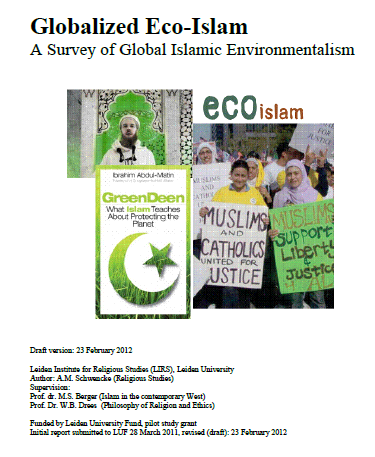 Does Islamic Environmentalism exist? That is a question posed by researchers at Leiden University in a paper entitled Globalized Eco-Islam – A Survey of Global Islamic Environmentalism. The survey published earlier this year seeks to answer who is speaking out for Islam about environmental issues (the actors) and what ideas, theories, perspectives and views are proposed (the discourses)?
The researchers argue that a new type of environmental movement is emerging, Islamic Environmentalism, that includes Muslim engaged within a wide range of environmental and sustainability issues such as eco-philosophies, environmental law and eco-certified halal products and services.
Does Islamic Environmentalism exist? That is a question posed by researchers at Leiden University in a paper entitled Globalized Eco-Islam – A Survey of Global Islamic Environmentalism. The survey published earlier this year seeks to answer who is speaking out for Islam about environmental issues (the actors) and what ideas, theories, perspectives and views are proposed (the discourses)?
The researchers argue that a new type of environmental movement is emerging, Islamic Environmentalism, that includes Muslim engaged within a wide range of environmental and sustainability issues such as eco-philosophies, environmental law and eco-certified halal products and services.
The report is chronologically structured, documenting the rise of the environmental movement from the early seventies to the present, highlighting the evolution of Islamic environmental theories. It also covers Muslim environmental policy makers, interfaith platforms, civil society groups, individuals and communities, the financial and business sectors and the contributions of Islamic scholars towards the development of Islamic Environmentalism.
The findings of the review confirm that Islamic Environmentalism does exist and that it has taken on various forms over the last forty years, evolving from a more theoretical approach in the 1970’s that concentrated on Islamic theories of nature and its implications, to the last decade where these principles were put into practice. Recently it has spread to larger and more receptive audiences that aim to Green their Deen, through adopting renewable energy, clean technologies and sourcing organic and/or regionally grown food.
The survey summarizes the approaches taken by the Muslim community under the umbrella of Islamic Environmentalism. These include:
1) Theological and Islamic law based (classical normative)
2) Mystical philosophical nature or eco-philosophy (ethical)
3) Reform of science and technology (Islamic science)
4) Social political reform (Eco-Islamist)
5) Land-water resource management, nature conservation (conservationist)
6) Green lifestyles and the economy (Green Deen)
7) Sustainable Islamic Finance and economics, commerce and trade
While the researchers readily admit that this is a snapshot of a developing movement, there is great potential for further research to be conducted, especially in capturing grass-roots projects and initiatives already in place but not documented in the developing world. Leiden University will continue research into the area Islamic perspectives on sustainable development and currently has a proposal before the Netherlands Scientific Research Fund.

